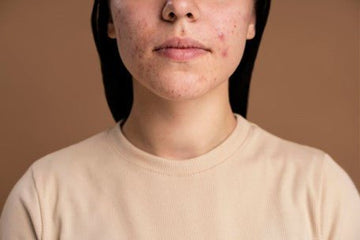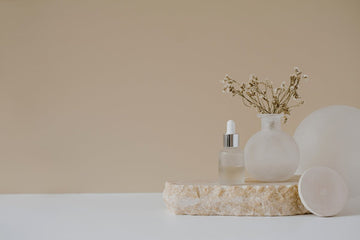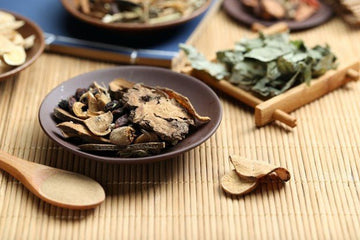How Traditional Chinese Medicine (TCM) Treats Eczema Symptoms and Skin Conditions?
Feb 08, 2024
What is eczema?
Eczema, also known as atopic dermatitis, is a common skin condition for eczema sufferers which causes dry skin, itchiness, scaly patches, and rashes. It can affect the face, hands, and feet, along with other areas where the skin folds. The cause of this condition is unknown, but a combination of genetic, environmental, and immune system factors is believed to contribute to its development. Try alternative treatment such as TCM for Eczema Singapore.

How TCM Treats Eczema in Singapore?
Traditional Chinese Medicine (TCM) perceives eczema as a manifestation of internal imbalances, often tied to disruptions in the body's Qi (energy) and blood flow. It is also seen to be brought on by an excess of wind, dampness, or heat in our bodies. These imbalances can be influenced by various factors, including stress, diet, emotions, and environmental conditions.
Wind
In the context of eczema, excessive wind is often associated with external factors such as exposure to drafts, or internal factors like poor Qi circulation. It is believed to contribute to the sudden onset and unpredictability of eczema flare-ups. The lesions which appear, when caused by wind, can manifest in different locations and may take on different appearances.
Dampness
Dampness refers to an accumulation of fluids or moisture in the body. It is believed to be caused by consuming cold or raw foods, along with external factors such as living in an environment with high humidity. Eczema associated with dampness may appear as oozing lesions or blisters, and the skin may exhibit a moist quality.
Heat
Internal heat can be influenced by factors such as emotional stress, hormonal changes, and dietary choices that generate heat. It is often linked to the aggravation of eczema symptoms. If an individual has an excess of heat, their eczema may be red with inflamed patches and feel hot to the touch.
What Are Eczema TCM Solutions?
Herbal medication
TCM practitioners use herbal medicine to address the imbalances in your body. Not every individual will receive the same combination of herbs as they will be carefully selected based on their specific constitution and the nature of their eczema. Here are some common herbs used to tackle eczema caused by different imbalances:
- Chrysanthemum (菊花 JuHua)
Chrysanthemum is a cooling herb commonly used in TCM formulations for eczema. Its cooling properties help to counteract excess heat in the body, reducing inflammation and soothing irritated skin. Chrysanthemum is often recommended when eczema is associated with heat-related imbalances.
- Ledebouriella root (防风 FangFeng)
Ledebouriella root is a herb which can dispel wind and alleviate itching. By calming the skin and reducing the urge to scratch at it, this herb plays a role in managing discomfort caused by eczema. It is also frequently included in remedies to tackle conditions brought on by external pathogens.
- Coix seed (薏苡仁
Coix seed possesses diuretic properties and is commonly used to eliminate dampness from the body. In TCM, dampness is associated with excessive moisture or fluid retention, and a contributing factor to eczema. The seed may be included in remedies to promote fluid metabolism and reduce skin discomfort.
Acupuncture
Acupuncture involves the insertion of fine needles into specific points on the body to stimulate energy flow and restore balance. When it comes to the treatment of eczema, acupuncture remains a key approach of TCM that offers a holistic approach to addressing both the symptoms and underlying causes of the condition. This treatment may improve blood flow to areas affected by eczema, promoting the healing of skin lesions and repairing of skin barrier. As eczema may also be aggravated by stress, acupuncture’s ability to encourage relaxation can be beneficial in managing symptoms.
Dietary therapy
TCM practitioners often tailor dietary recommendations to an individual's constitution, health condition, and specific symptoms. What works for one person may not be suitable for another, as TCM recognizes the uniqueness of each individual's body and health status. Food in TCM is divided into several categories; cool, hot and neutral. This is influenced not only by the type of food but also by how they are cooked and the length of time they take to grow.
Eczema is often associated with excess heat. Therefore, cooling foods such as leafy vegetables are recommended to help regulate the body’s internal temperature. Individuals with eczema may also be advised to avoid food that can cause flare-ups such as dairy products, wheat, and sugar.

Eczema management with TCM
TCM topical cream
Topical creams may be prescribed by TCM practitioners and used in conjunction with other treatments such as herbal remedies or acupuncture. These creams usually contain natural ingredients made from herbs that are designed to soothe the skin to aid in the recovery of eczema. At Serene SkinLab, our Calming Repair Cream is specially formulated to repair the skin barrier, moisturise dry skin, and relieve eczema. It contains ginseng, to promote a balanced and resilient skin, and honeysuckle, to alleviate excess heat and inflammation. This not only provides immediate relief but also contributes to the long-term recovery of the skin.
Mind-body practices
TCM recognizes the interconnectedness of emotions and physical health. Emotional imbalances, such as frustration, anger, or anxiety, are believed to affect the flow of Qi and may lead to skin conditions like eczema. Your TCM practitioner may recommend activities such as Tai Chi and Qi Gong which combine gentle movements with breath control. They promote relaxation and balance of Qi, enhancing not only the skin but also both physical and emotional health.
How can you include TCM Treatment in your Eczema care routine?
Consultation with a TCM practitioner
Schedule a consultation with a qualified TCM practitioner. During this session, the practitioner will conduct a thorough assessment of your health, considering factors such as lifestyle, and specific eczema symptoms. During the assessment, diagnostic methods such as pulse reading, and tongue examination will be used to determine the underlying imbalances contributing to your eczema. This will help in the development of a personalised treatment plan.
Integrating TCM remedies and practices alongside conventional treatments
Before integrating TCM with conventional treatments, we recommend speaking with your healthcare providers to be aware of any precautions that need to be taken. For example, TCM remedies may interact with conventional medications and your healthcare provider may need to adjust treatment plans to prevent clashes.
Long-term management and preventative strategies with TCM
Long-term management with TCM may take the form of regular follow-ups with your TCM practitioner to assess your progress and to assess if there are any adjustments needed to the treatment plan. You are encouraged to include TCM-inspired self-care practices such as dietary management, and activities like Qi Gong and Tai Chi, into your life to minimise the possibility of recurrences.

Are you interested in TCM for eczema?
TCM takes a holistic approach towards eczema, integrating the use of natural herbs and personalised treatment plans. If you are interested in a TCM-inspired routine for this condition, you may want to consider Serene SkinLab’s Calming Repair Cream. It is formulated with herbs that are known for their skin-soothing properties and promote overall skin health. Designed to complement the TCM principles of providing a holistic approach, this repair cream includes natural ingredients carefully chosen for their abilities to alleviate itching, and inflammation, and repair the skin barrier.
If you have any questions about our Calming Repair Cream or are interested in other products which you can browse through in our shop, feel free to contact us and we will be in touch soon.




